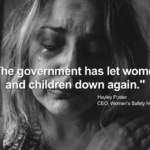2020: ‘Worst Year’ for Domestic Violence Offences

When lockdowns hit around the world earlier this year, most people were concerned about their jobs, worried about how to homeschool the kids, stressed about pasta and toilet paper shortages, and the absence of friends and families, along with all of the stresses and strains which came with something we’d never had to do before: stay home.
But spare a thought for the many women both here in Australia, and around the world, for whom staying at home put their very lives at risk.
The Federal Government announced $150 million for domestic and family violence in March expecting a rise in case numbers, but according to those working in crisis support and in front line emergency services, that funding hasn’t gone anywhere near what’s needed to assist the many women who have suffered this year: strangulation cases, threats to kill, serious head injuries, sexual assaults have all risen.
Services stretched to the limit
Emergency accommodation, counselling and other necessary services are all stretched beyond their limits, with unacceptable waiting lists now, for women who are in stations akin to ticking time bombs. Situations that can’t wait.
The coronavirus restrictions, combined with unemployment and financial stress linked to the pandemic, have caused domestic violence cases to increase alarmingly across the country. And there’s likely more to come with the job losses yet to peak and the current economic situation remaining uncertain. Christmas too, which is now only weeks away, usually sees a spike in domestic violence offences.
In mid-year, a survey by the Australian Institute of Criminology revealed almost 10% of Australian women in a relationship had experienced domestic violence during the coronavirus crisis. Two-thirds of the women said the attacks started or became worse during the pandemic.
Proposed new legislation
Just a few months ago, the New South Wales Government introduced a law to Parliament which proposes to criminalise ‘coercive control.’
Coercive control is where a person exhibits control over another person which so overbearing that it is unacceptable in modern society. Such conduct may encompass monitoring and restricting a person’s communications and movements, threatening to harm a person and/or their loved ones if they don’t act in a particular way, excessively restricting access to money, or a course of inflicting stalking or intimidation, or conduct which may amount to the alternative offence of contravening an apprehended violence order. (AVO).
Over time, research has suggested that this type of behaviour is the most common risk factor in domestic and family violence.
Many domestic and family violence experts say that by making this coercive control behaviour against the law, victims could be saved from dangerous and potentially escalating situations much earlier.
If the Crimes (Domestic and Personal Violence) Amendment Bill 2020 is passed, then the offence would carry a maximum penalty of 5 years in prison, or 10 years where the offending is directed towards or occurs in the presence of a child.
In Australia, Tasmania is currently the only jurisdiction to criminalise some coercive control behaviours (mainly in relation to financial and emotional abuse), and research suggests that the use of these offences to be limited.
South Australia is currently working to implement a law that would criminalise coercive control, and that if passed, would hold the toughest penalties for offenders.
In Queensland, the issue of whether or not coercive control should be made illegal was an election issue prior to voting in October. It is yet to be taken up further by Queensland premier
Annastacia Palaszczuk.
Currently, Western Australia, the Northern Territory, Victoria and the ACT are yet to act on the issue.
Changing the law is not always the answer
There are also concerns that if the law is passed in NSW, it could be relatively meaningless, simply because family and domestic violence is an incredibly complex, toxic dynamic. Those of us looking in from the outside fail time and again to understand that sometimes victims are either not capable of identifying specific types of abuse, or not willing to.
Globally, the United Kingdom and Ireland have both implemented coercive control laws with some success. However, the implementation was done in conjunction with extensive training and consultation, to ensure that police, prosecutors, support workers, responders – understand coercive control and how to appropriately respond and how to ensure that laws are enforced justly.
For many, New South Wales’ proposed laws are a step in the right direction however, the law cannot be relied upon alone. There remains critical issues such as where victims go when they must leave home, what protections they have, how they support themselves financially, and the types of assistance they need to rebuild their shattered lives.
These services require incredible amounts of funding. And despite significant investments during the pandemic and ongoing at a State and Federal level, frontline services say the money isn’t enough, isn’t coming through fast enough, or isn’t being allocated wisely enough to cope with increasing demand. In many cases, the experts suggest, we’re just continuing to put a band-aid on a gaping wound.
Prevention, as they say, is better than cure, and across the globe, on the whole, targeted e prevention programmes show positive success and a glimmer of hope, but these programmes are always sporadic and small scale.
Unfortunately we are a long way off from solving this issue. Changing the laws, better funding, and prevention initiatives, are all effective to some degree, so we could argue that Australia is doing what it can. The problem is time and again, we’re still failing victims with no real change in sight.
The Counting Dead Women project has recorded 48 women who have died as a result of violence in Australia this year, upon investigation by police, 35 of these deaths have been linked to







